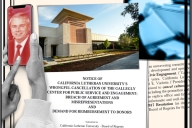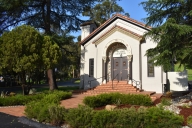You have /5 articles left.
Sign up for a free account or log in.
.jpg?itok=pRwy2_MV)
Belmont University students attend chapel.
Sam Simpkins/Belmont University
Belmont University, a private Christian institution in Nashville, Tenn., plans to break a long-standing tradition of only hiring Christian instructors by opening some faculty positions to Jewish candidates.
University leaders recently announced they’re specifically recruiting Jewish faculty members to teach in three of its graduate programs, hopefully as early as this spring. The Board of Trustees and Faculty Senate also plan to consider a similar decision at the undergraduate level later this year.
The announcement, made at a Faculty Senate meeting in November, was met with a range of reactions. Campus administrators and some members of the local Jewish community celebrated the shift as a step toward greater interreligious inclusion, aligned with recent Jewish-Christian interfaith efforts at Belmont. Some scholars, in and outside the institution, believe the change moves the university too far from its Christian roots, while others say the policy isn’t inclusive enough, embracing one faith community to the exclusion of others.
Erin Shankel, president of the Faculty Senate, said there are “as many opinions as there are people" among her Belmont colleagues.
“That’s part of the beauty and complexity of working in an ecumenical Christian university,” she said. “We don’t share one doctrine, so there’s room for a whole breadth of opinions. It’s one of the things that makes Belmont great. It also can lead to a lack of consensus on things like this.”
The university plans to recruit Jewish faculty members to teach in the university’s law school, pharmacy school and new medical school, scheduled to open in 2024. The accreditors for both the law school and the medical school prohibit the university from requiring faculty members be Christian but do allow the university to state a preference for applicants of specific faiths in their job ads.
Greg Jones, president of Belmont, said his discussions about religion with Jewish friends have enhanced his own faith, and he believes the addition of Jewish faculty will do the same for the university.
He described Jews and Christians as “siblings” that “share a significant history—not entirely positive, to be sure—but a significant history. My own engagement and understanding of what Jews would call the Hebrew Bible, what Christians call the Old Testament, has been deepened by those interreligious conversations in really profound ways.”
Jones said Belmont may open faculty positions to applicants from other religious traditions in the future, but “we’re not making any judgments about that now.”
Inclusive or Exclusive?
Shaul Kelner, associate professor of sociology and Jewish studies at Vanderbilt University, said the move to recruit Jewish faculty seems consistent with the trajectory of the university since it cut off its affiliation with the Tennessee Baptist Convention in 2007. (The relationship ended because Belmont leaders wanted to be able to select their own trustees.)
“Nashville itself has been growing enormously, and it’s a very cosmopolitan city,” Kelner said. “And I think for Belmont to stay an important institution in Nashville, it’s changing along with the city, and it’s changing in ways that reflect the ways that the city is also becoming more diverse.”
Kelner noted that the decision mirrors other Christian higher ed institutions that have shed their denominational affiliations over the years and sought to diversify. Vanderbilt, for example, was founded as a Methodist university but broke ties with the church in 1914, giving it the freedom to do “what it thought would be best for the university in terms of hiring the best scholars and also recruiting students of all types.”
While the majority of Belmont students are Christian, the number of non-Christian students has increased over the years. The university enrolled 8,910 students total this fall, including 77 Jewish students, 69 Muslim students, 13 Hindu students, 29 Buddhist students and 636 students with no religious affiliation, according to internal data from the university. Belmont held its first high holiday services for Jewish students this fall because of the growing population. The university isn’t actively recruiting non-Christian students, but Jones said he wants them to feel at home there.
Belmont has increasingly invested in programming focused on Jewish-Christian relations in recent years, including an ongoing weekly online dialogue group for clergy and lay leaders launched in spring 2020 by local rabbi Mark Schiftan and Jon Roebuck, who directs Belmont’s Reverend Charlie Curb Center for Faith Leadership. The center also recently launched the Belmont Initiative for Jewish Engagement, which expands on the college’s interfaith classes and events focused on the two groups.
Roebuck said responses to the interfaith work have been mostly positive, but “any time you’re plowing new ground, you’re going to come across some rocks in the soil.”
He said some Christians have asked him, “Why are you hanging out with those folks?” And some Jewish members of the dialogue group have expressed skepticism or raised concerns about being evangelized, but “part of the trust we develop is we’re not saying to them every time we meet … ‘I hope you get saved this week.’ At the same time, there’s never been a pull on their side to say, ‘Your theology is wrong.’”
Allowing the hiring of Jewish faculty is a major step for the university—and a welcome one, said Schiftan, rabbi emeritus at The Temple, a Reform synagogue in Nashville. He’s been advocating for this policy change for years and believes it will benefit the local Jewish community.
“As a minority faith community, I think the importance of not just acceptance and understanding but a real desire to exchange honest dialogue between Jews and Christians at this time of rising antisemitism is especially important work,” he said.
Schiftan said he hopes the institution becomes “even more inclusive” and embraces faculty members of other faiths in the future, but “the natural place to begin is with the Judeo-Christian tradition.”
“I look at it not as exclusionary to other faiths,” he said. “They are starting their inclusion … with the most approximate faith to Christianity, and that is Judaism. I think it is an unfair premise to think that an institution after 150 years is going to open the doors [to] the widest aperture of faith communities right at its first effort of opening the doors at all.”
J. Cody Nielsen, director of the Center for Spirituality and Social Justice at Dickinson College, said Belmont is entering a “really critical moment” where it’s modeling “that you can be an institution that was founded by Christians and still seeks to uphold Christian principles” and also embrace a “pluralistic theology.” At the same time, hiring Jewish faculty is a politically “safe step” for moderate or conservative-leaning Christians, not a comprehensive shift toward interreligious inclusion.
He noted that Islam is expected to outpace Christianity as the world’s largest religion in the future, and non-Abrahamic religions are too often left out of interfaith initiatives.
“I would not agree that it’s the right step in the right direction,” he said. “I think if you’re going to do it, you better do all of it. When you take one step onto the next platform … there is a possibility of staticity or complacency.”
Kenneth Stern, director of the Center for the Study of Hate at Bard College, who has written about Jewish student issues in the past, said the recruitment of Jewish faculty members at Belmont sounds like a positive development but raises questions about how Belmont will incorporate Jewish instructors into the campus community.
The 2021 Faculty Handbook says the university “may discriminate on religious grounds in its employment practices in order to fulfill its mission,” and “the university can best fulfill its vision and mission statements when the faculty is composed of persons who confess that Jesus Christ is Lord.”
He said that likely isn’t going to fly with Jewish faculty members.
“If they want to invite people into their community and have them respect the religious bent of the organization, that’s fine,” Stern said. “But the expectation that’s reflected in the handbook that they have to be practicing, that they have to accept Jesus Christ as their personal savior or whatever, that seems like something that would have to be changed to attract Jewish faculty.”
Shankel, president of the Belmont Faculty Senate, imagines some changes will have to be made, particularly to the tenure and promotion process, which traditionally asks faculty members about their level of church involvement.
Administrators and faculty members are re-examining the language in the handbook and brainstorming ways to create an inclusive environment for new Jewish colleagues, Jones said. For example, the university plans to ensure new faculty members can take time off for Jewish holidays.
“There will be growing pains for us, and yet it’s really important,” he said. “We don’t want Jewish faculty to just be at Belmont. We want them to feel an integral part of Belmont.”
Having to make policy shifts or offer new religious accommodations isn’t about “holding our nose and saying, ‘Well, we can make this work.’ It’s actually saying, ‘You bring something really valuable and rich to our community, and we want to honor that and embrace you.’”


.png)






.jpg?itok=nC76ZX1j)